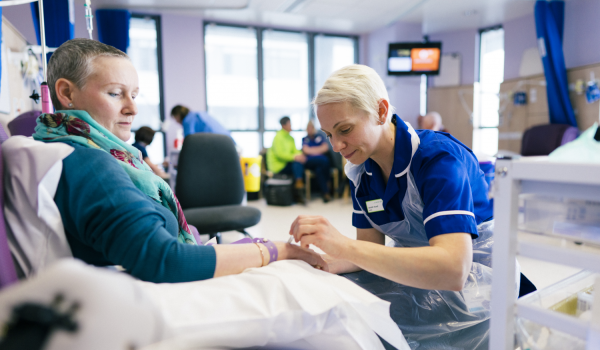A multicentre phase II randomised controlled trial to evaluate the efficacy of Adaptive Therapy (AT) with carboplatin, based on changes in CA125, in patients with relapsed platinum-sensitive high grade serous or high grade endometrioid ovarian cancer
Who can take part
Please note - unless we state otherwise in the summary, you need to talk to your doctor about joining a trial.
You may be able to take part in this trial if you:
-
are aged 18 years or older
-
have high-grade serous or high-grade endometrioid carcinoma of the ovary, fallopian tube or peritoneum
-
have recently received chemotherapy that included platinum (cisplatin or carboplatin) and have responded to it
-
have previously received a PARP inhibitor
-
have a ca125 level of 100 or more on entering the trial
-
have disease on imaging that can be measured
This is not an exhaustive list. If you're interested in participating in a clinical trial, you should speak to your doctor about what other criteria might apply.
About the trial
Researchers in this trial are looking to find out whether a new way of giving carboplatin chemotherapy (adaptive therapy "AT") is as safe as and more effective than the current standard way of giving carboplatin in women with advanced recurrent ovarian cancer.
Recurrent ovarian cancer is usually treated with chemotherapy. The chemotherapy aims to kill as many cancer cells as possible while not causing severe side effects in the patient. However, some cancer cells can become resistant to the drug over time, making it less effective. When this happens, the cancer becomes harder to treat.
In this new research, scientists are trying a different approach to giving chemotherapy called adaptive therapy (AT.) In the trial, they want to give the patients on AT tailored doses of chemotherapy based on how their tumor responds to treatment. By doing this, they hope to prevent the cancer from becoming resistant to chemotherapy and, at the same time, reduce the side effects for patients.
This research is important because it could offer women with ovarian cancer a more personalized and effective way to fight the disease and potentially extend their lives, all while making treatment more tolerable.
If you take part in the trial you will be randomised (placed into a treatment group by a computer) into one of two treatment groups:
- Control group: In this group, participants receive the usual standard of care 6 courses of carboplatin chemotherapy
- AT group: In the adaptive therapy group, the amount of treatment you get will be based on the value of the CA125 blood test. If the CA125 is lower they'll give you less carboplatin chemotherapy. If the CA125 is higher they'll give you more carboplatin.
Everyone taking part in the trial will be followed up by the trial team for 12 months from the end of their last treatment. You will be asked to donate samples of blood and tumour as part of the trial.
This information was last reviewed on 12/01/2024. Please note that the status of clinical trials can change at short notice. You should always check with your clinical team which trials may be suitable for your situation.



